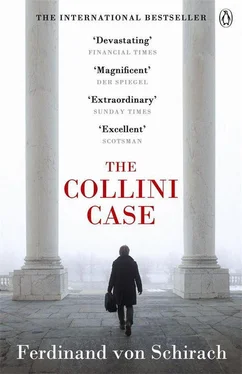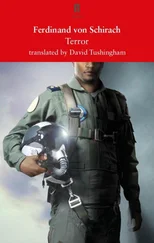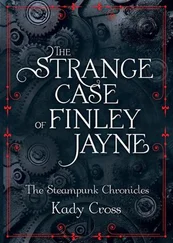On that day, 14 November 1943, Fabrizio Collini was nine years old. He was lord and master of one cow, four pigs, eleven chickens and two cats on his family’s farm, he was an outstanding military commander, cycle-racing champion and circus artiste. He had already seen a crashed plane and two dead soldiers; he owned a pair of field glasses, a bicycle and a pocketknife with a stag-horn handle. He also had a sister; she was six years older than him, and most of the time he couldn’t stand her. But what mattered now was that he was hungry.
Fabrizio took the short cut, the path over the fields. In between the village of Corria and his father’s small farm there was a hill, a place to which courting couples resorted at the weekend. From this hill you had a good view of the area, which was still peaceful. The Allies had landed in Sicily four months ago; Benito Mussolini had been overthrown and taken prisoner. The king asked Marshal Pietro Badoglio to form a military government, and a short time later an armistice came into force between the Allies and the new Italian government. On orders from Adolf Hitler, Mussolini was rescued from a mountain hotel by German paratroopers, and two weeks later he was installed as head of government of the newly founded Italian Social Republic, the ‘ Repubblica Sociale Italiana’ , a Fascist government under the protectorate of the German Reich. Fabrizio knew very little about all that. Of course he knew there was a war on, his father’s two brothers had fallen three years earlier fighting in the Italian campaign against Greece, but he hardly remembered them. His father had shed tears at the time. War, he said, was madness. Fabrizio remembered the word – folia , ‘madness’ – not that he understood what it meant, but his father had said it again and again, and Fabrizio realized that it was something terrible. Now the Germans were everywhere in their uniforms. Sometimes family members from Genoa visited the village, they said the Germans were taking everything they needed away from the factories. The men’s faces were gloomy, there was whispering about partisans and assassination attempts, and although the grown-ups tried to hide everything from the children, they didn’t play cops and robbers any more, they played partisans and Germans. Sometimes Father put on his grey coat and a beret in the evening, kissed his two children on the forehead and left the farm. Fabrizio heard his sister crying on those nights, and when he called for her she came into his room and whispered that Father was a partisan. Their mother had died when Fabrizio was born.
When Fabrizio reached the plateau on top of the hill he stopped for a moment, as usual. He could see his father’s farm, the farmhouse and the little barn. He raced downhill. His sister was standing in the doorway when he reached the paving stones of the farmyard. She was still wearing her black dress from church, and she was crying. Fabrizio jumped off his bicycle, which fell over. He ran to her. She hugged him and kept on saying, ‘They’ve taken Father away. The Germans have taken Father away.’ Fabrizio began to cry as well. The children stood like that for a long time. Fabrizio had questions to ask, but his sister wouldn’t talk to him.
After a while they let go of each other and went into the kitchen. Mechanically, his sister went over to the stove, broke two eggs into a pan and cut bread. Fabrizio ate, she herself didn’t touch the food on her plate. ‘When you’ve finished,’ she said, ‘we’ll go to see Uncle Mauro. He’s sure to know what to do.’ Mauro was their mother’s elder brother, a hard man with no children, and their only living relation. His farm was almost ten kilometres away. Fabrizio’s sister stroked his head and looked out of the window. Suddenly she jumped up, crying, ‘Run, Fabrizio, they’re coming back.’ Fabrizio heard the hammering of the engine, he could see the German military vehicle through the window, a jeep with the windscreen folded down and spare tyres on the bonnet. There was a single soldier at the wheel. ‘Run, go on, run!’ cried his sister. The fear in her voice frightened Fabrizio. He ran across the farmyard and hid in the big dog kennel that had stood empty for years, where he rolled himself up in a dirty blanket that was scratchy and full of holes. Through a crack between the boards of the kennel he saw the tyres of the jeep, and a pair of boots that stood still for a moment, turned and went towards the house. Then he heard his sister scream. He couldn’t help it, he crawled out of the kennel, ran back to the farmhouse door and pushed the door of the kitchen open.
His sister was lying on her back on the wide kitchen table, her head towards the door. Her dress was torn, her white underwear spilling out over its coarse fabric. The man stood between her legs; he had let his trousers drop, his shirt and jacket were buttoned up. Fabrizio knew what the military badge meant, he was a private soldier, not an officer. He had a huge, jagged scar on his forehead. He had put his pistol to the girl’s breast, the hammer cocked, his finger on the trigger. She was bleeding from a wound on her forehead; there was hair stuck to the butt of the pistol. The man’s face was red, he was panting and sweating.
Fabrizio screamed. It was a loud scream, louder than any other noise in the farmyard, a single high note, and as he screamed everything happened at the same time. The soldier, startled, stepped back. The girl was wearing a gold chain with an enamel locket showing the Virgin Mary, a present from her mother. The sights of the pistol caught in the chain, which stretched taut round the girl’s neck, holding the gun in place. The man snatched at the pistol, its resistance was transferred to the trigger. A shot rang out. The bullet went through the girl’s neck, tearing through her artery, and emerged to embed itself in the kitchen table. She clutched at her throat, and blood came welling out between her hands. The soldier stumbled back, slipped, and fell on the floor. Fabrizio was still screaming. He couldn’t make sense of the images: the pale blue smoke from the shot, the erect penis, the blood on the kitchen table. Then he saw his father’s brown tobacco tin. It was standing on the kitchen shelves where it had always stood. Every evening after supper, Father would roll two cigarettes and talk to the children while he smoked them. Fabrizio could see the two Red Indians on the lacquered wooden lid, they were sitting by the campfire, peacefully, eternally. He stopped screaming. The soldier was sitting on the floor with the pistol in his lap. He stared at Fabrizio. The soldier’s eyes were like water, pale blue, almost colourless. Fabrizio had never seen eyes like that before; he couldn’t look away from them. He simply stood there looking into the man’s watery pale eyes. Only when the soldier moved did he manage to move as well, and at last he realized that he must run for his life.
Fabrizio ran out of the kitchen and over the farmyard, slipping on the wet paving stones and hurting his right knee. Father would be angry with him for tearing his Sunday trousers. On past the dog kennel and the pond, into the pine forest, then over the narrow bridge and along the woodland path until he was out on the open plain. He didn’t know how long he had been running, he could have gone on running for ever, but then he saw his uncle’s farmhouse. The house was very different from his father’s, a large, long house standing on a rise in the ground, with an avenue of pine trees leading up to it. The front door was not locked. Fabrizio almost ran down his Aunt Giulia at the entrance. He stammered breathlessly until his uncle arrived with the two farm labourers, then he spoke more calmly, and at last his uncle understood. He took his shotgun from the cupboard and drove out of the yard in his car.
Читать дальше












